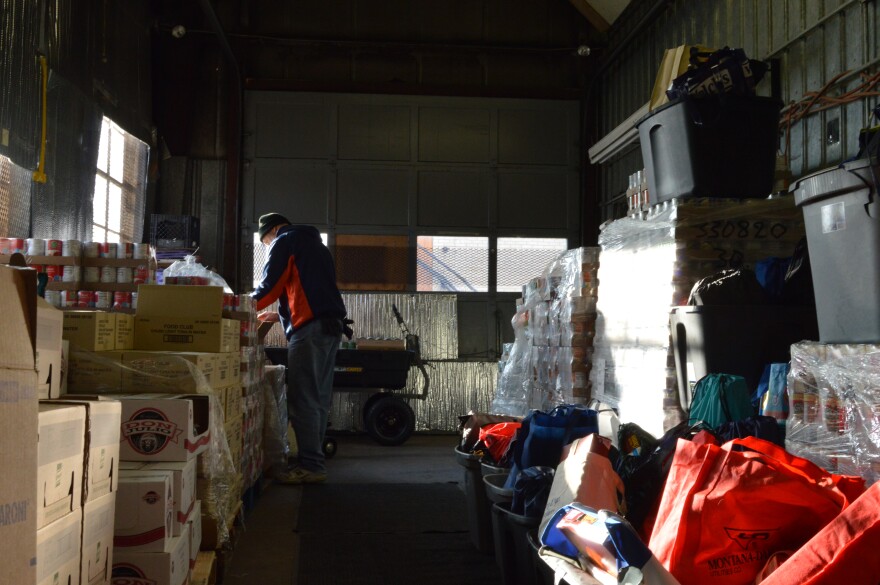Wednesday mornings at the Food Group in Sheridan are usually busy.
Volunteers are separating mountains of food into small piles on tables and rolling carts. Additional volunteers will pack the Food Group's weekend food bags-the cornerstone of the organization's work.
"You might see something such as a bag of pasta, a can of spaghetti meat sauce, some sort of canned vegetables, bread, could be a tortilla or loaf bread. A breakfast item, granola bars or a cereal box, and two pieces of fresh fruit," said Keri McMeans, the Food Group's executive director.
Those food bags are delivered to schools in reusable bags and students take them home on Fridays. They are meant to help them get through the weekend with breakfast, lunch, dinner and snacks. That way kids can come back to school on Monday focused.
McMeans said hunger affects students' ability to learn, a part of something called toxic stress.
"When a child comes to school and they're thinking about their next meal or how they didn't have breakfast, the world stops for them. And that's what we say is the barrier. We can't reach them in the way that we need to, to help them grow, until we feed them," she said.
Sheridan's Food Group started in 2010 after community members heard stories about local school children not having enough food at home. Arin Waddell, the Chair of the Food Group's Board, said they met at a local coffee shop and decided they were going to do something about it.
"We started with only 40 kids, all at Coffeen Elementary, which is our neediest school in the district. We didn't have any money. We were using the Food Bank of the Rockies. We got the same food all the time from them. It was whatever they had," Waddell said.
Over time, the Food Group became its own non-profit. It got more donations, expanded throughout the county and created new programs. The group decided to invest in purchasing their own high quality food for the kids.
Now, they are serving more kids than ever before.
"Our metrics are difficult because we are anonymous...We serve for weekend food bags, we serve about 420 children per week during the school year," McMeans said.
McMeans said there are teen pantries for middle school and high school students found at the local schools. They've also retrofitted newspaper boxes that are placed throughout the county. Those are filled with food and hygiene products and are available anytime.
"So totally, we're serving at least 500 plus children in Sheridan County per week," she said.
Initially the Food Group's biggest challenge was getting people to realize this is a big issue locally, Waddell said. According to the Wyoming Department of Education, around 31 percent of students in Sheridan County schools qualify for free and reduced lunch, though there are no requirements for kids to be in the Food Group's programs.
"In the beginning, we had a huge amount of resistance. People would say, 'no way do we have that kind of poverty here.' And 'this is a bootstrap state, so just go ahead and pull up your bootstraps.' Poverty is super complicated. It's not just pulling up your bootstraps," Waddell said.
First Lady Jennie Gordon first heard about Sheridan's food insecurity issues after running into Waddell at the grocery store as she was buying food for the weekend bags.
She thought a lot about the issue, and this October, Gordon announced the Wyoming Hunger Initiative. It's an issue she's been studying across the state, getting to know charities and groups that are fighting food insecurity in their communities. But for her, this initiative isn't about starting something new.
"What I hope to do is really to make people aware of all of the organizations in their communities that are doing good work. So rather than reinventing the wheel, I'd just like to spotlight the organizations [and] make people aware of what's really going on," she said.
According to No Kid Hungry, a national campaign seeking to solve childhood hunger, one in six children in Wyoming struggles with hunger. Gordon said her microphone as the state's first lady lends to the mission of stopping childhood hunger in Wyoming. Gordon's position also allows her to raise money through the Governor's Residence Foundation that supports her initiative.
"So we're going to with the board, the foundation board that we've assembled, we're going to work on trying to make a grant process for organizations that either want to start something or build off and make things bigger can receive grants that will be associated with fixing this food insecurity that we have in our state," she said.
While the initiative is still getting started, Gordon said she's focused on educating the public on the issue and increasing accessibility of information about resources for those who need it and for those interested in helping.
Recently, Gordon's initiative and the Wyoming Department of Education received a $50,000 grant from No Kid Hungry to work on instituting a school breakfast program in classrooms throughout the state.
Have a question about this story? Contact the reporter, Catherine Wheeler, at cwheel11@uwyo.edu.








